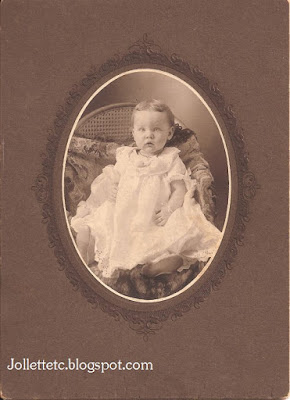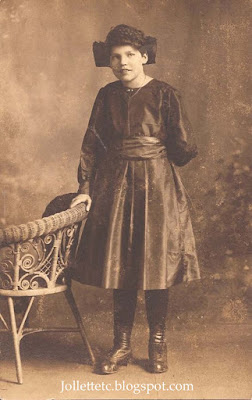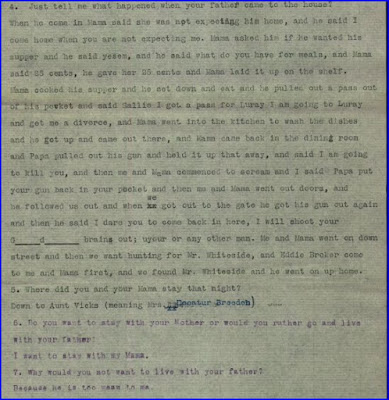Sepia Saturday challenges bloggers to share family
history through old photographs.
The dark colored dress on the young lady in this week’s
Sepia Saturday prompt made me think of a photo of my maternal grandfather’s
cousin, Alda Beatrice Clift.
The photo always gives me a start. I gasp at the sight of
what appears to be an amputated arm. However, because I have seen photos of her
in later years with two healthy arms, I know she was standing with her arm
behind her back.
Alda was the fifth and last child of Sallie Jollett Clift
and George Clift. What a beautiful baby she was.
 |
| Alda Clift Look at that sweet bracelet! 1905 or 1906 |
Her brothers Leonard and
Raymond were hard-working and respectable young men.
 |
| Leonard and Raymond Clift |
They deserved a better
childhood than the one they experienced. At the ages of 14, 13, and 8,
respectively, the Clift children testified against their father in their
parents’ divorce case.
The shocking details of Sallie and George’s marriage have
been the subject of this blog several times. If you are new to the party, you
can read accounts HERE and HERE.
The testimony of 8-year old Alda is heart-wrenching.
Lawyer: Just tell me what happened when your father came
to the house.
Alda: When he come
in, Mama said she was not expecting him home, and he said I come home when you
are not expecting me. Mama asked him if
he wanted his supper and he said yesem, and he said what do you have for meals,
and Mama said 25 cents, and he gave her 25 cents and she laid it up on the
shelf. Mama cooked his supper and he set
down and he eat and he pulled out a pass out of his pocket and said Sallie I
got a pass for Luray. I am going to
Luray and get me a divorce, and Mama went into the kitchen to wash the dishes
and he got up and came out there, and Mama came back in the dining room and
Papa pulled out his gun and held it up that away, and said I am going to kill
you, and then me and Mama commenced to scream and I said Papa put your gun back
in your pocket and then me and Mama went out doors, and he followed us out and
when we got out to the gate he got his gun out again and then he said I dare
you to come back in here, I will shoot your G__ D__ brains out; you or any
other man. Me and Mama went on down
street and then we went hunting for Mr. Whiteside, and Eddie Bricker come to me
and Mama first, and we found Mr. Whiteside and he went on up home.
Lawyer: Where did
you and your Mama stay that night?
Alda: Down to Aunt Vick’s (meaning Mrs. Decatur Breeden)
Lawyer: Do you
want to stay with your mother or would you rather go live with your father?
Alda: I want to
stay with my Mama.
Lawyer: Why would
you not want to live with your father?
Alda: Because he
is too mean to me.
No doubt Alda had to grow up fast, which might explain
why she married at age 15 to Leon Dewey Monger. Two daughters and ten years
later, they divorced. Three days after the divorce was final, Alda married
Wilson Suite, a barber from Washington D.C. Fortunately, they lived happily
ever after until Wilson’s death in 1960. Alda outlived him by 22 years.
If I ever met Alda, I do not remember. What I know of her
is from public records - census, marriage, divorce, chancery lawsuits - and
from photos. Like her Jollett relatives, she was ever-present at reunions.
 |
| Alda is 4th from left on back row standing between her cousins Russell Coleman and Violetta Davis 1919 - Alda was 14 |
 |
| 1934 Reunion Lewis Lloyd Jollett (nephew of Sallie Clift), Sallie Clift, Alda Clift Monger Suite and Wilson Suite |
She
was obviously loved by her cousins.
 |
| Violetta Davis Ryan with Alda Clift Suite That's Alda's daughter in the middle, but is it Janice or Gwen? |
What amuses me, however, is the Clift penchant for
poetry. Her father George penned 18 stanzas while incarcerated for that gun
incident of 1914 that Alda described. Her mother Sallie published a poem in
memory of her brother-in-law Walter Davis.
 |
| The newspaper clipping of this poem is glued to the inside back cover of Mary Frances Jollett Davis's photo album. |
When Sallie died, Alda wrote a poem about her dear mother
and best friend and had it published in the local newspaper. Her daughters
likewise wrote poems expressing their love for their grandmother Sallie.
Alda wrote another poem on her mother's birthday.
The Clift poems are not polished. They are sappy and
sentimental. The rhyme and rhythm are often uneven. Yet, they succeed in
showing heart, devotion, gratitude, loyalty, admiration, regret - qualities
lacking in those public records.
I like to think Alda carried on the tradition of writing
poems in her mother’s memory; however, I have not found any others. I wonder if
daughters Gwen and Janice wrote poems at Alda’s death in 1982.
To read more stories of girls in dark dresses, open the
gate to Sepia Saturday.
Wendy
© 2017, Wendy Mathias.
All rights reserved.









How traumatic for Alda having to testify in court regarding her parents' divorce. Makes one "glad" that it is a lot "easier" to get divorced these days and children are sometimes spared the experience of having to go to court. One wonders if perhaps alcohol was somehow involved in her dad's behavior? Sappy poems indeed, but seemed like they were written by a more "loving" man than one who threatened his wife and family.
ReplyDeleteYour family stories are so fascinating to read.
betty
When you mentioned poems and jail,I remembered her father and that poem he wrote. Poor child that had to go through that.
ReplyDeleteGreat photos and rhymes.
ReplyDeleteYou start with a girl in a dark dress (an excellent match and link to the prompt, by the way) and then take us to some very dark places. A fascinating dip into family and social history at its best.
ReplyDeleteYes, the missing arm is very unnerving. Poor girl to have so much drama and trauma in her life. At least she settled happily later.
ReplyDeleteBlimey ..what a terrible ordeal and what bravery in overcoming it
ReplyDeleteGood that Alda and Sallie survived those bad times and were able to live happily afterwards. The family poetry is wonderful!
ReplyDeleteWhat an ordeal for Alda, but she looks very happy in the 1934 Reunion photo. So wonderful that you have located those heartfelt poems written by extended family. Sappy and sentimental perhaps, but precious nevertheless.
ReplyDeleteFamily stories can indeed take many shapes. It's interesting how Alda's dress, bow, and shoes resemble the girl on my post which dates from 1912. The fad for memorial poems may have been promoted by newspapers.
ReplyDeleteEveryone has a little poetry in them and these, though not polished, were pure and sweet and loving. The rhyme and rhythm were altogether secondary.
ReplyDeleteI love that there was obviously so much thought (and love) in the poems!
ReplyDeletePoetry does allow people to become sentimental...which songs also do. They are often the things that remind us of special times in our lives. The gun episode with her father must have been very frightening for her, and then to testify in court about it! Many emotions were probably triggered (sorry about that) in her life.
ReplyDeleteI continue to be amazed at the number of family photographs you have. I find it sad that the children had to testify in court against their father. I don't think that's generally done in court these days (but I may be wrong).
ReplyDeleteThat court record is really something. Those poor children. But the poems are great. They may be sappy but they are a great way to remember the family.
ReplyDelete